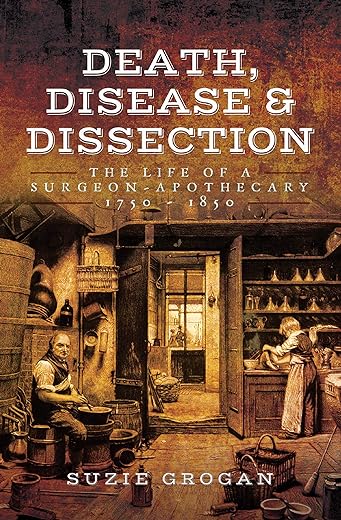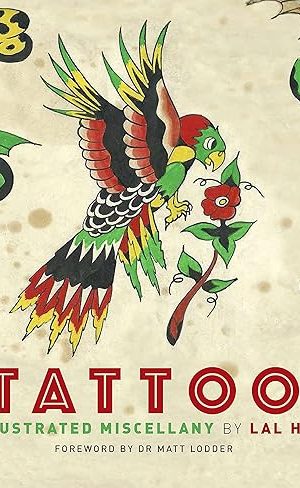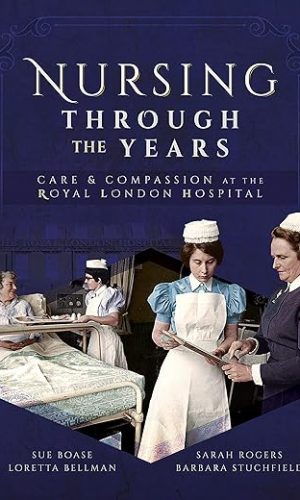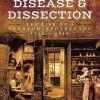Death, Disease & Dissection: The Life of a Surgeon-Apothecary 1750–1850
£3.80
“A deep dive into the education and lives of a medical professional’s life over the span of 100 years . . . A good addition to any medical historian’s library” (The Lazy Historian).
Imagine performing surgery on a patient without anesthetic or administering medicine that could kill or cure. Welcome to the world of the surgeon-apothecary.
During the eighteenth and nineteenth centuries, significant changes occurred in medicine. New treatments were developed and medical training improved. Yet, with doctors’ fees out of the reach of ordinary people, most relied on the advice of their local apothecary, among them, the poet John Keats, who worked at Guy’s Hospital in London. These men were the general practitioners of their time, making up pills and potions for everything from toothache to childbirth.
Death, Disease & Dissection examines the vital role these men played within their communities, their training, the treatments they offered, the quacks, and the shocking sights and sounds in hospitals and operating theaters of the time. Suzie Grogan transports readers through 100 years of medical history, exploring the impact of illness and death and bringing the experiences of the surgeon-apothecary vividly to life.
“I think the author has done a wonderful job of researching the topic and presenting the history of the profession, and biographical information on some of the most influential Surgeon-Apothecaries of the period. . . . This book is well organized and full of fascinating information on the topic.” —A Line from a Book
Imagine performing surgery on a patient without anesthetic or administering medicine that could kill or cure. Welcome to the world of the surgeon-apothecary.
During the eighteenth and nineteenth centuries, significant changes occurred in medicine. New treatments were developed and medical training improved. Yet, with doctors’ fees out of the reach of ordinary people, most relied on the advice of their local apothecary, among them, the poet John Keats, who worked at Guy’s Hospital in London. These men were the general practitioners of their time, making up pills and potions for everything from toothache to childbirth.
Death, Disease & Dissection examines the vital role these men played within their communities, their training, the treatments they offered, the quacks, and the shocking sights and sounds in hospitals and operating theaters of the time. Suzie Grogan transports readers through 100 years of medical history, exploring the impact of illness and death and bringing the experiences of the surgeon-apothecary vividly to life.
“I think the author has done a wonderful job of researching the topic and presenting the history of the profession, and biographical information on some of the most influential Surgeon-Apothecaries of the period. . . . This book is well organized and full of fascinating information on the topic.” —A Line from a Book
Read more
Additional information
| Publisher | Pen & Sword History (30 Oct. 2017) |
|---|---|
| Language | English |
| File size | 40380 KB |
| Text-to-Speech | Enabled |
| Screen Reader | Supported |
| Enhanced typesetting | Enabled |
| X-Ray | Not Enabled |
| Word Wise | Enabled |
| Sticky notes | On Kindle Scribe |
| Print length | 237 pages |











by LadyM
Great introduction to the history of medicine. It brings the characters and the period to life without being difficult to read. Highly recommended.
by Amazon Customer
This is a really useful book if you need to know a bit or a lot about certain aspects of medicine between 1750 and 1850. An excellent work of research, well-presented and brilliantly informative.
by Angela Buckley
I’ve recently become quite fascinated by medical history, especially as it is relevant for so many areas of historical study, and Death, Disease and Dissection is the perfect introduction – it is an engrossing and extremely informative read. Suzie has researched the topic meticulously and presented it in a readable and engaging narrative, featuring the extraordinary individuals who cared so deeply for the welfare and health of others. There are also body snatchers, men-midwives and quack doctors, all packed into this comprehensive history of 100 years of medicine. In addition, Suzie highlights some inspiring medical men, shares quirky anecdotes and unusual details, and draws out relevant themes for today. Death, Disease and Dissection is an excellent book, and I would highly recommend it to everyone!
by Kelly Patricia
Interesting and informative. A good insight into medical developments and dangers. What a painful time to be alive – just how did anyone survive the operations of their day?! The diaries and research done really brings the times to life. Thank you!
by Stephen Bigger
Still reading it, and I will update this later, but so far interesting, well researched and well written. A book to stay on the shelf long term.
by Angela McFadden
Fascinating book about a neglected figure in medical history. Apothecaries are centre stage in this lovely book. Detailed, lovingly researched and written, with pictures!! What’s not to love?
by Ms P. C. O’Neill
Bit boring to be honest and I usually enjoy a bit of gore. Gave up
by MA
This book paints a vivid picture of the life of an apothecary surgeon in 18th and 19th century England. It was well researched and interesting to read. I particularly liked the portraits of individual doctors and John Keats. It gave a real sense of what their lives were like. The author conveyed the horror of operating with no anaesthetic and the practices of the body snatchers, but without being too graphic. She also sensitively conveyed the good medical men could do by caring for their patients even if they had few cures. I liked the links to modern general practice.